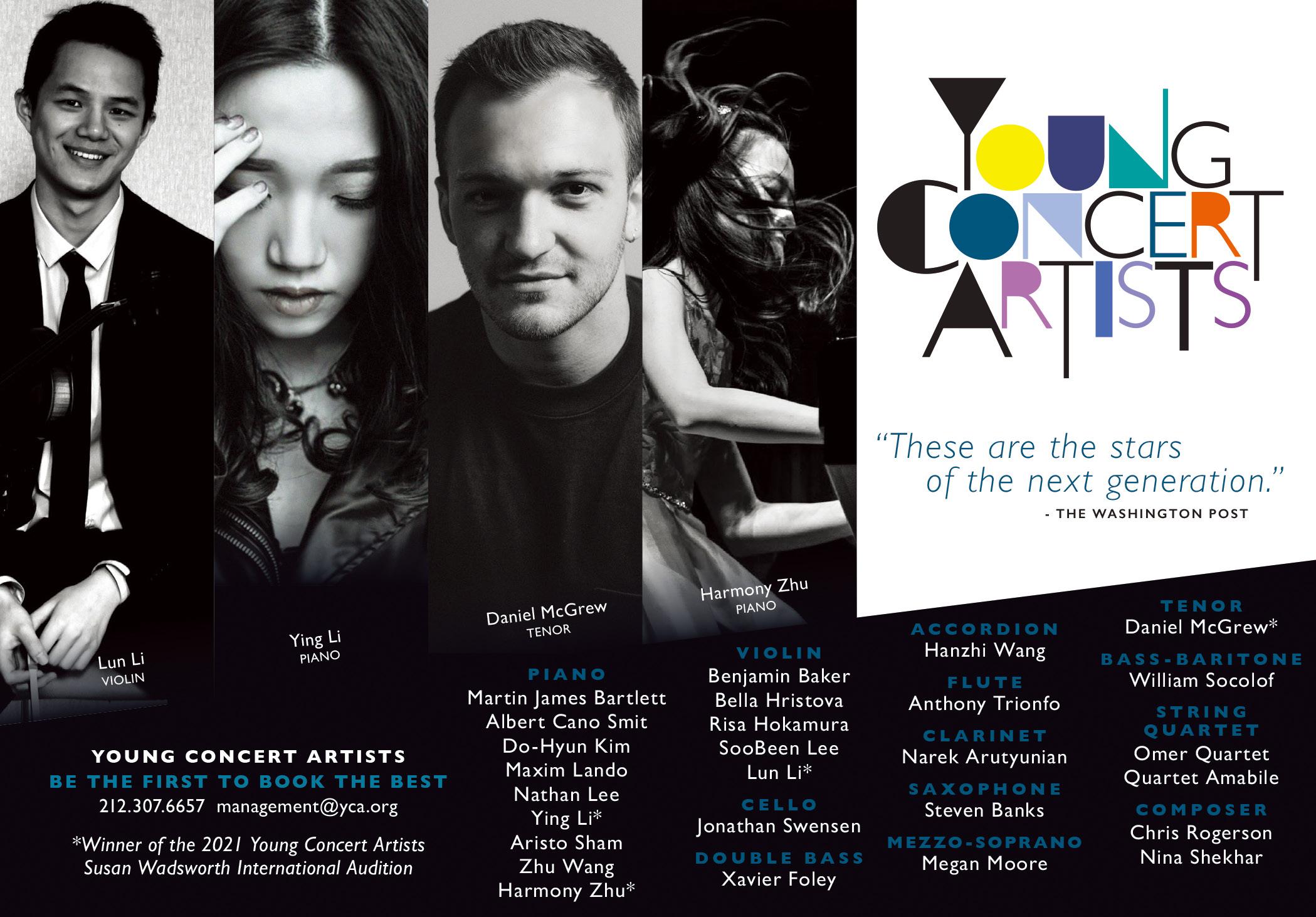
12 minute read
New World Stages
Many emerging musicians were about to make their marks at orchestras nationwide when the pandemic hit. Some put their careers on pause, while others performed online or used the time to address issues of racial equity and social justice. As concert life gradually returns, what’s next for emerging musicians in today’s shifting landscape?
By Brin Solomon
It can be hard to launch an artistic career at the best of times, and the middle of a pandemic is hardly the best of times. Traditionally, an emerging artist might be urged to play as many concerts in as many places as possible to build their résumé, raise their profile, and expand their network of collaborators. With COVID-19 putting the brakes on both concerts and travel, this was hardly a viable way forward. And while many musicians and orchestras leapt online with virtual performances, often in wildly creative ways, some audiences tended to stick to more familiar names in a moment of uncertainty, especially with the internet doing away with geographical restrictions on which concerts they could attend. Now that vaccines are widely available, in-person performing has tentatively resumed in many places, and musicians are once again hopping from hub to hub to play with orchestras around the country and the globe. Nevertheless, many uncertainties still remain, from new variants with unknown properties to larger shifts in the politics of the classical music industry and the nature of live performance more broadly.
Many performances originally slated for April of 2020 were postponed instead of cancelled outright, which means performers are now grappling with how to fit rescheduled gigs next to new commitments: the flux of a freelance schedule in full swing. Those who stepped away from their instruments while in-person performances were on hold are now having to build their stamina back up and re-develop their practice routines, a familiar challenge to any musician who takes a break to focus on other areas of life—or simply to recharge.
Other challenges are more closely tied to the events of the past 22 months. Some musicians are mourning the loss of loved ones to the ongoing pandemic. Some audience members are still staying away from in-person performances, wary of testing the limits of the vaccines and comfortable in new routines of online engagement. In the wake of the deep and wide-ranging conversations about racial equity and social justice that started in the summer of 2020 and continue today, some artists are finding meaningful change afoot while others are running into the limits of how fast ensembles and venues are able—or willing—to change.
It will be many years before the impact of this plague can be fully quantified, but one thing is certain: Whatever is coming, it’s the rising stars of today that will shape the future of the classical music world as the effects of COVID-19 continue to unfold. How are they navigating this shifting musical landscape? Here’s what four emerging artists and two leaders at nonprofits that support young musicians have to say.
Sterling Elliott performs the Schumann Cello Concerto in A minor with the Sphinx Symphony Orchestra and conductor Michael Morgan at the 2019 Sphinx Competition.
Sterling Elliott, cello
Sterling Elliott earned his bachelor’s degree from Juilliard this past May, but he already has a long professional résumé, including appearances with orchestras around the country as well as numerous awards, among them the 2021 Avery Fisher Career Grant and first place in the Senior Division of the 2019 Sphinx Competition.
In February of 2020, I got a call to play with the Boston Symphony Orchestra, and it was a funny call, because the reason is that there was a concert lined up that involved the guest artists traveling to and from China. This was right around the time that China was in total lockdown, so that couldn’t happen, and they needed an artist who could perform, and I got the call. It was such an exciting opportunity, and I had absolutely no idea what was around the corner. For it to all just shut down right then and there was unbelievable for the longest time.
Playing with my friends is one of the most enjoyable things I’ve ever done, so I didn’t want to stop doing that, and very early in the pandemic a friend and I recorded a piece asynchronously. We didn’t have a click track, and having to follow a partner’s musical ideas and rubato without any visual cues, entirely aurally, was very, very difficult. The end product was satisfying, but I did not find the process enjoyable. I did a few of these projects and I began to realize that everything I loved about music-making and collaboration was—for me— not evident in these projects; I was really beginning to dread them, and hate them, and scorn them. And that felt like it was defeating the purpose, so I stopped accepting that kind of gig.
In the middle of 2020, [issuing statements about racial equity] almost became a trend that people were doing and then have dropped, but looking at things now, there are absolutely organizations and people that have made drastic changes. It’s a conversation that had never been new to me, growing up through the Sphinx Organization, which is designed to promote diversity in the arts, but this made me realize that it’s really about taking it into our own hands, whether the people around us are changing or not.
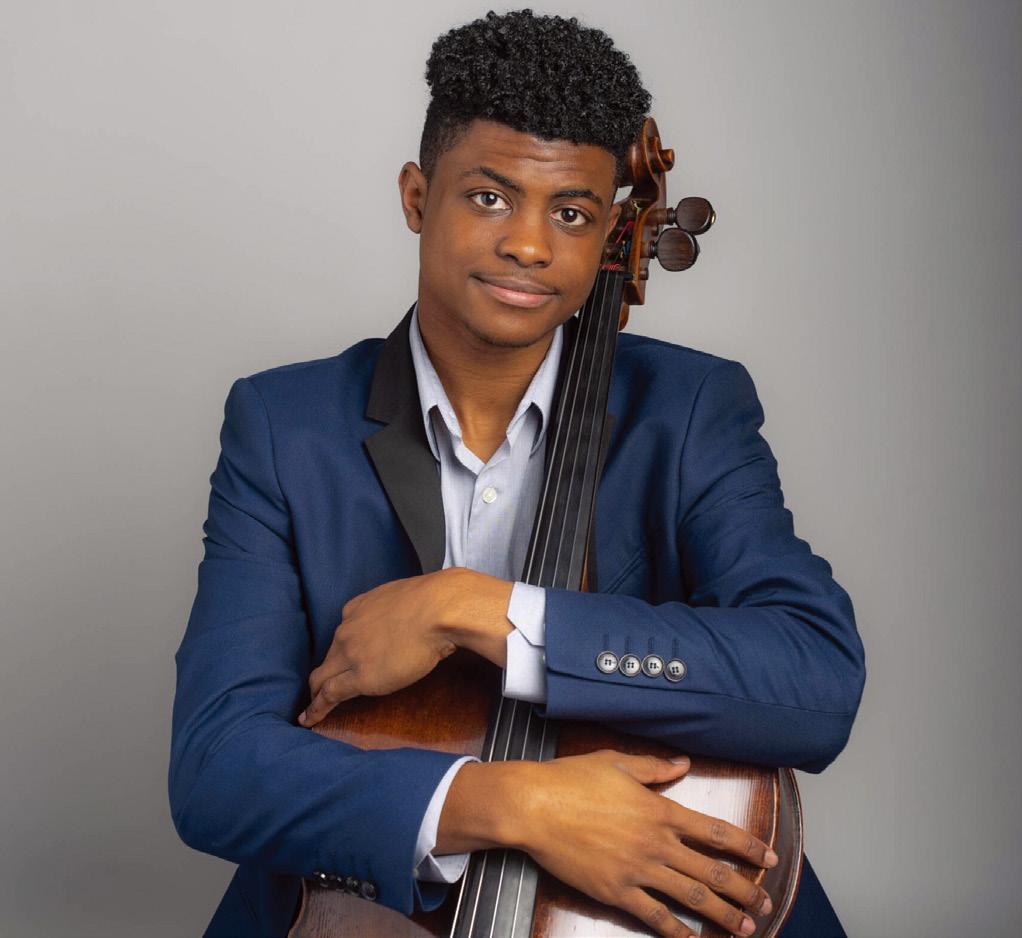
In the middle of 2020, [issuing statements about racial equity] almost became a trend that people were doing and then dropped, but looking at things now, there are absolutely organizations and people that have made drastic changes. – Sterling Elliott
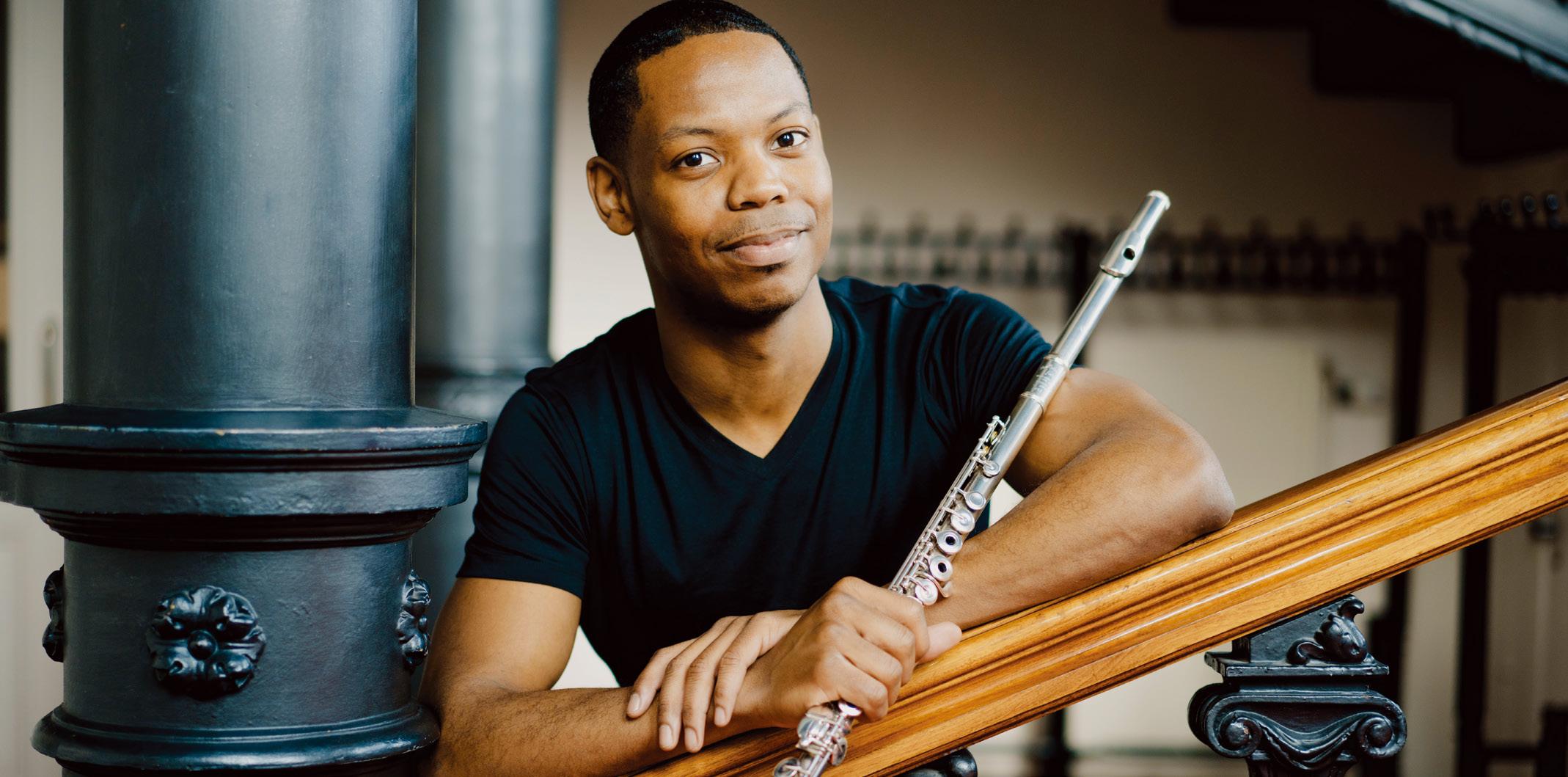
Brandon Patrick George
Brandon Patrick George, flute
Brandon Patrick George is perhaps best known as the flutist for the Imani Winds, the NYC-based wind quintet, but he also has a burgeoning solo career spanning genres and continents, including concertos, unaccompanied recitals, chamber performances, and collaborations with movers and shakers of the classical world.
A group of friends thought it would be fun if we did a streaming salon where I played a recital for them. And that was really nerve-racking! In a concert hall, you’re all having this experience together, you can see each other, you can hear people breathing—that puts me at ease. So that was fun, but I did not feel inspired the same way I think other musicians did in terms of trying to stream things. I think it was actually very sad: You’re grieving this loss of your concert schedule, but there’s also this fear that you might get sick or your loved ones might get sick, and for me that was very emotionally draining. So I spent a lot of time practicing on my own and reading a lot of books, because I just couldn’t bring myself to do that kind of work.
It’s been really special to be in front of people again. I feel, in a way, that I went from zero to one hundred, from not travelling at all to travelling too much. I didn’t have any flatout cancellations—most of my concerts were just postponed, which makes my year very full, adding all of these postponed COVID commitments to what would already be a full season. But that’s felt very good!
I think most of the challenges in this moment for an emerging artist have nothing to do with the pandemic. You have ways of putting your material out there that artists 25 years ago didn’t have. That’s a unique opportunity, but how do you cut through all that? For me, it boils down to: What do you have to say? I remember artists who make a statement, even if I don’t remember every single thing about every single piece. So the real challenge is to create content that tells a story, that tells your story, that lets people know who you are. That’s personal. That’s yours and no one else’s. The more you can do that, I think the more success you’ll have.
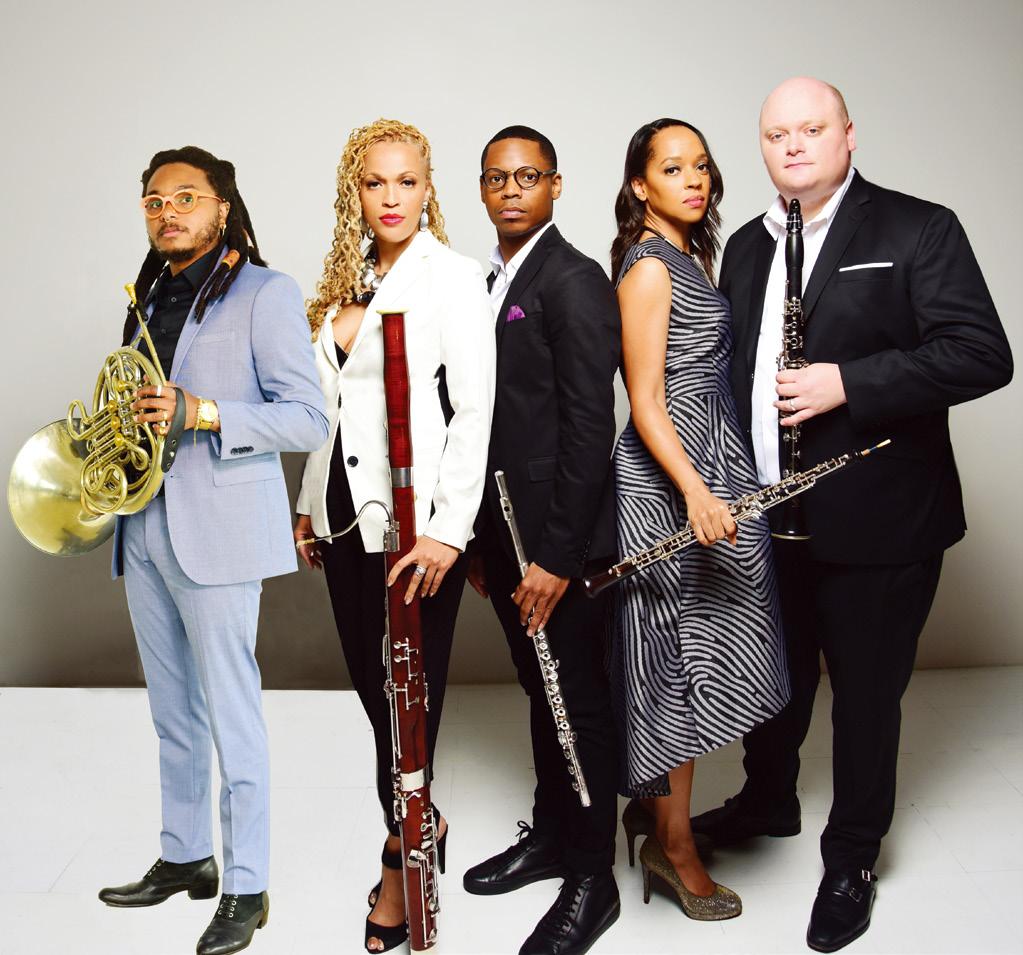
Brandon Patrick George is a member of the NYC-based Imani Winds ensemble. From left: Kevin Newton, Monica Ellis, Brandon Patrick George, Toyin Spellman-Diaz, and Mark Dover. What do you have to say? The real challenge is to create content that tells a story, that tells your story, that lets people know who you are. That’s yours and no one else’s.
– Brandon Patrick George
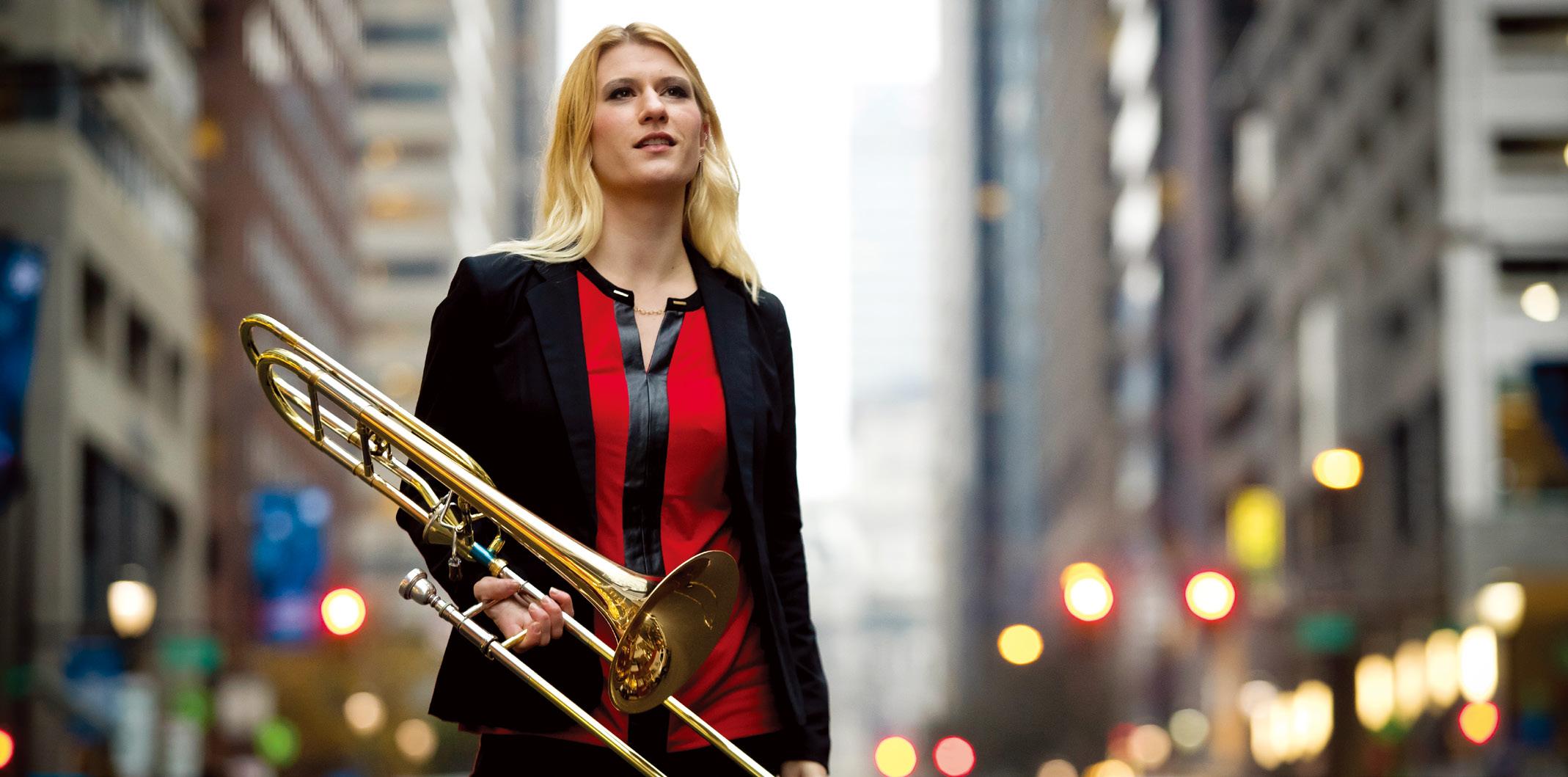
Brittany Lasch
Brittany Lasch, trombone
An in-demand soloist at orchestras and bands around the country, Brittany Lasch is assistant professor of trombone at Bowling Green State University in Ohio, and also principal trombone in the Michigan Opera Theatre Orchestra, where she was recently a part of the widely acclaimed production of Götterdämmerung that took place inside a parking garage.
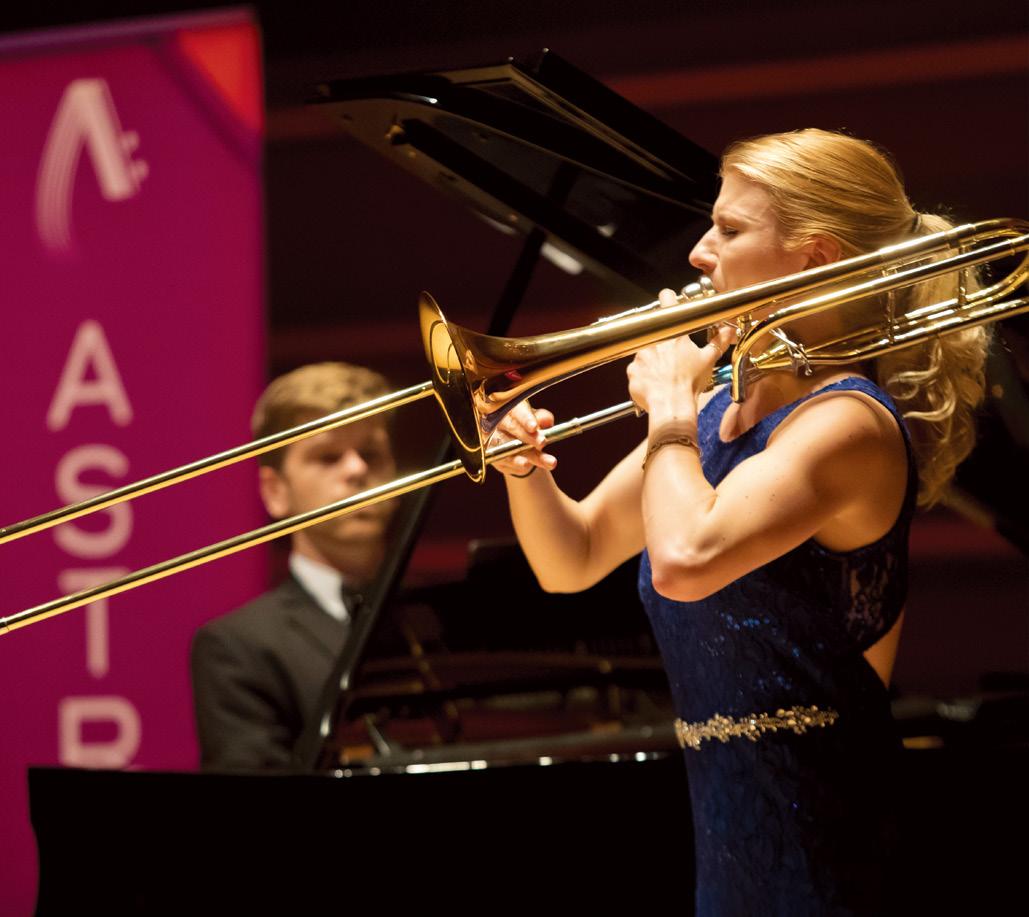
The way we’ve turned to the internet so much more than we ever did before does make me think it’s going to be hard to pull people back into opera houses. From what I’ve seen, it seems 50/50 in terms of whether audiences want in-person concerts versus being happy with livestreams. And I’ll admit that part of me really enjoys the streaming, particularly from major orchestras in places that I can’t physically be at. It’s hard for me to say that I’d be uncomfortable as an audience member, because I’m performing now! But I think the accessibility that was created during COVID would be a great thing to have linger after this virus.
When COVID first hit, I remember how many people started learning things I never bothered to think about, like video editing and overdubbing, and I distinctly remember making the choice not to do that, just because I felt that there were enough artistic voices on the internet. It was kind of nice to sit back and just hear what other people were doing.
As a trombone player, especially for the younger generations, it’s going to be harder than ever to have a full-time career as a symphony orchestra player. It broke my heart to see massive orchestras not pay their musicians during the shutdowns. And it’s a hard argument! They weren’t working. But it’s never happened before: You win one of these jobs and you think you’re all set, and then a virus comes and takes everything away.
I haven’t had many solo performances outside of my area, but I have a recital coming up in May, and I’ll be very curious how that audience reacts to me playing an aerosol-producing instrument. I’m triple-vaxxed, and I’ll take every precaution, but I wouldn’t blame them for being skeptical.
Ryan Brandenberg
Brittany Lasch performs with pianist Jason Wirth at the 2017 Astral National Auditions Winners Concert.
– Brittany Lasch
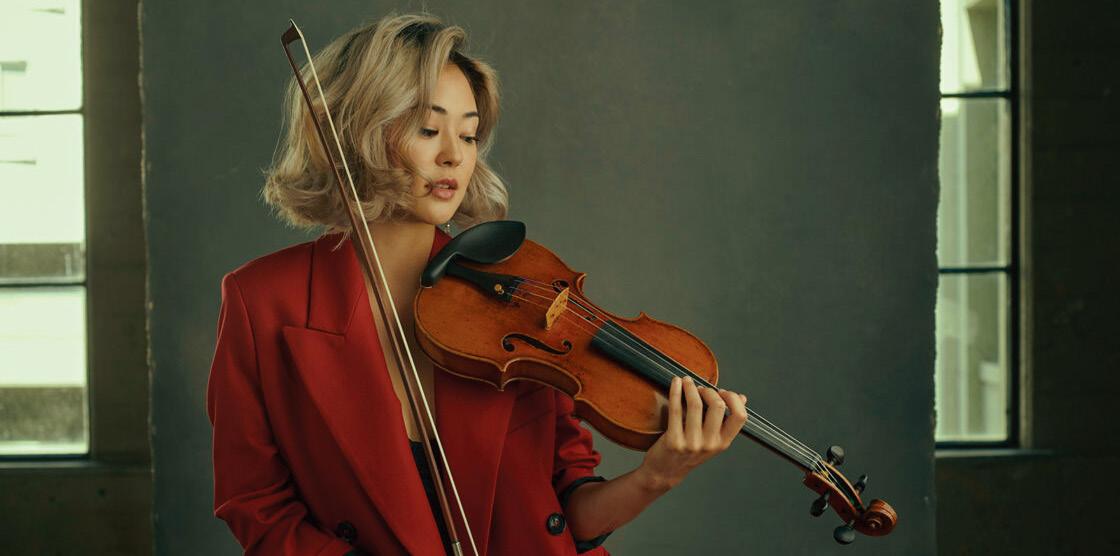
Simone Porter
Simone Porter, violin
Since her solo debut at age 10, Simone Porter has traveled the country and world to appear with orchestras ranging from the New York Philharmonic to the City Chamber Orchestra of Hong Kong. In addition to playing works from the standard canon, she also champions new music, working with living composers who are expanding the violin repertoire.
Coming back to my instrument after taking time off, I definitely had some Bambi legs when it came to technique. Up until this fall, I had a different kind of sound—playing in my apartment is different than playing to a microphone for streaming, which is different than playing to a live audience. But also, there’s a whole lexicon of how you stick out from or blend in with an orchestra that almost disappeared when I was in my apartment for so long. Energetically and physically, I needed to expand again once I got into larger spaces. It felt a little funky the first time I got back into a full hall.
Part of the reason I was taking time off from performing was that I was going to protests against police brutality pretty much every single day in LA. For me, and I think for a lot of my classical music friends, it was a time of existential crisis. We were torn between feeling love for the art and feeling very fed up with the system that distributes it. I see a lot of goodfaith action; I think the best of it is where the people who were already doing the work are amplified. The thing that seems to work the best is when there were already people doing this work and you just give them the mantle rather than tokenizing or ticking boxes. That seems to be happening more and more.
I think there’s an instinct to program conservatively to bring audiences back, and while I understand that, I also hope to see initiatives that take this as an opportunity to draw people in in a different way, with different programming and different collaborations. I’ve become obsessed with this quote by Simone Weil: “Absolute unmixed attention is prayer.” We’re in a field where duration is treated [by some] as a problem, and I love the idea that sustained attention could act as alignment with others in community instead.
Princeton Symphony Orchestra
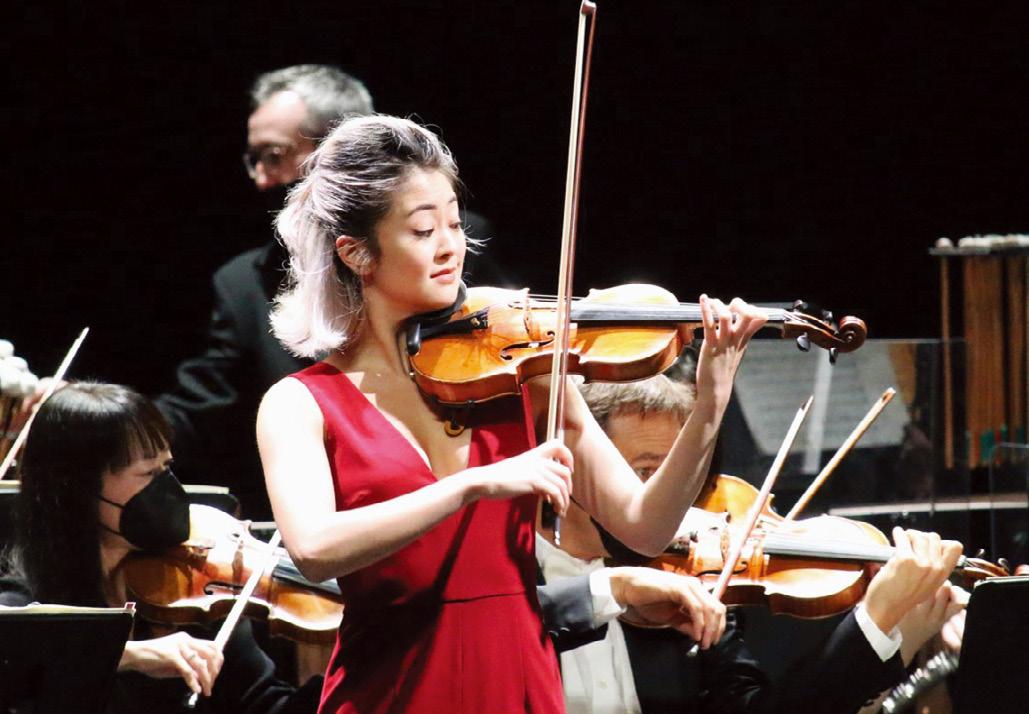
Simone Porter performs with New Jersey’s Princeton Symphony Orchestra and Music Director Rossen Milanov in October 2021.
Part of the reason I was taking time off from performing was that I was going to protests against police brutality pretty much every single day. For me, and I think for a lot of my classical music friends, we were torn between feeling love for the art and feeling fed up with the system that distributes it. – Simone Porter
Young Concert Artists
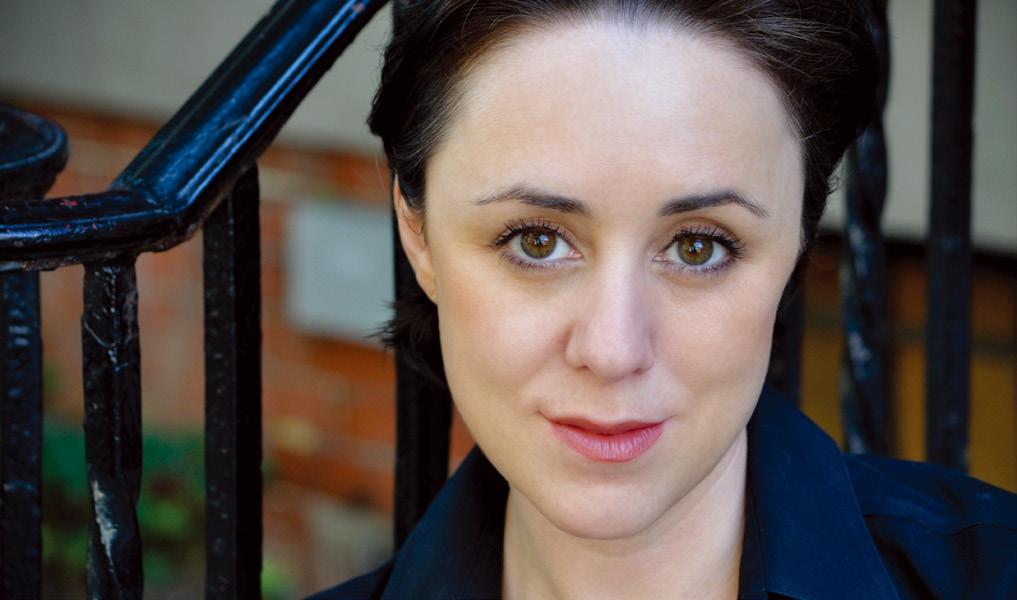
Christina Baker Chris Williams
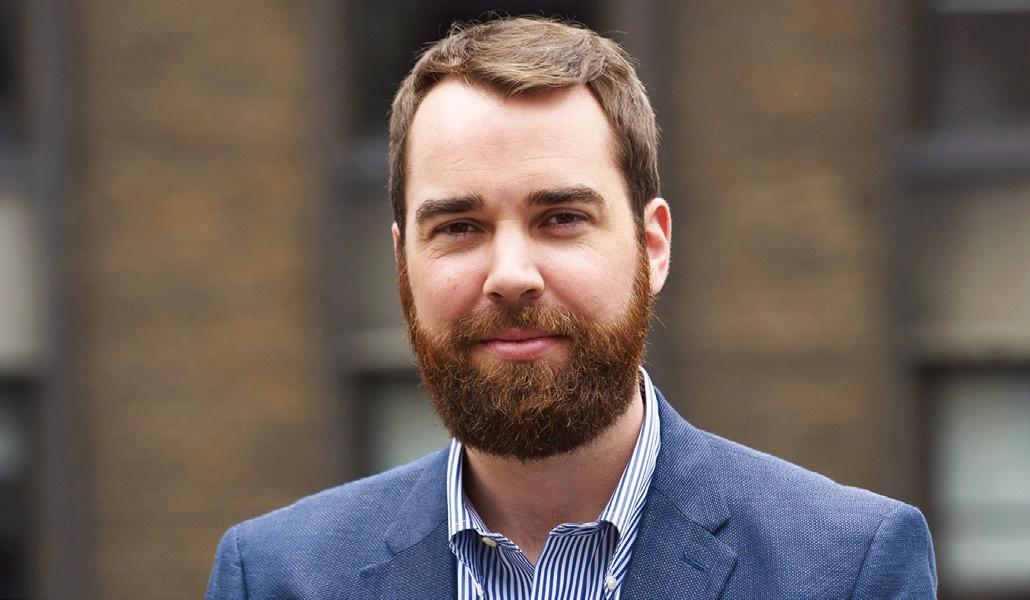
Christina Baker, Director of Artist Management at Young Concert Artists
People are excited to be back. Getting the houses that they had previously has been a challenge; we’re not 100 percent there yet, but the artists we work with are so happy to play live again. People are paying attention to racial equity; it’s very important to each of our artists. I think this generation is very special; they do have the answers. They’re the ones who are going to change everything.
Chris Williams, Senior Vice President at Concert Artists Guild
Classical music is finally coming to the table in the online world. Young artists have the savvy and the energy to come into that zone and dominate that sphere. They’re also leaning heavily into questions of social justice, and really asking the difficult questions. Young artists are modern thinkers. The question is very real for them: Where will we go in this genre?
BRIN SOLOMON is a writer and composer living and working in New York City. Bylines include National Sawdust Log, San Francisco Classical Voice, I Care If You Listen, and New Music USA.
